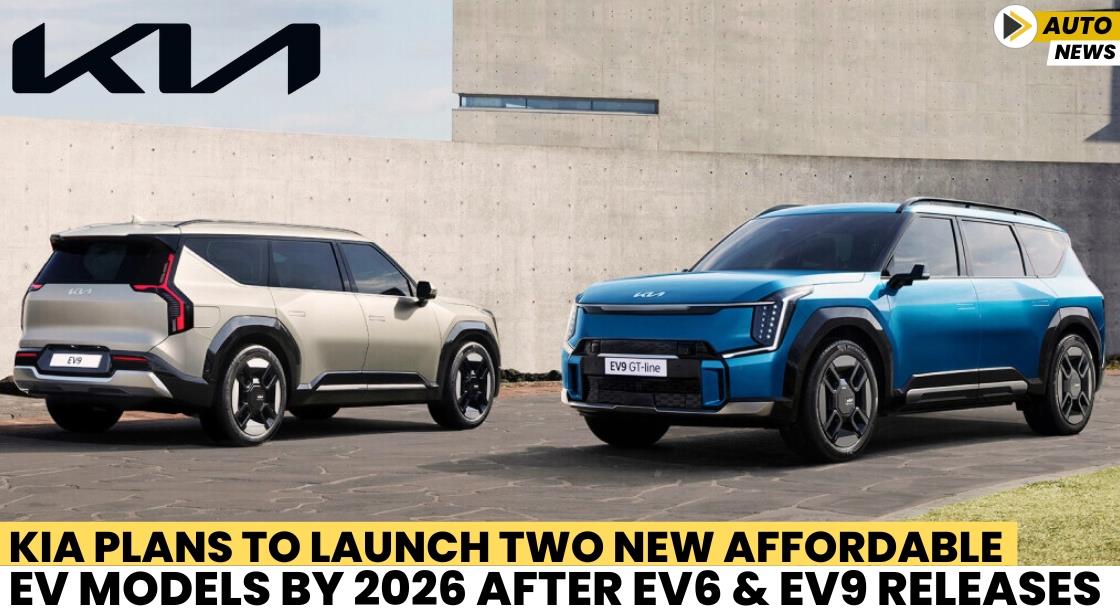Kia Plans to Launch Two New Affordable EV Models by 2026 After EV6 and EV9 Releases

News Synopsis
Kia India is set to enhance its electric vehicle (EV) lineup by introducing two new affordable models by 2026, according to a senior company executive. This strategic move aims to cater to a broader audience as the carmaker seeks to increase its presence in the burgeoning EV market in India.
Current Offerings: Premium Models
Currently, Kia offers the premium EV6 and EV9 models in India. The EV6 is priced between ₹60.97 lakh and ₹65.97 lakh (ex-showroom), while the recently launched EV9 comes with a significantly higher price tag of ₹1.30 crore (ex-showroom). These premium offerings have established Kia as a key player in the high-end EV segment, but the company recognizes the need to diversify its portfolio to attract a wider customer base.
Plans for New Affordable EVs
During a recent interaction with select journalists, Hardeep Singh Brar, Senior Vice President and Head of Sales and Marketing at Kia India, confirmed the company’s plans to focus on more affordable EV options. "Yes, we do. We will launch a new EV model in the second half of next year. We will launch another EV in 2026," Brar stated. This commitment highlights Kia's understanding of the market demand for cost-effective electric vehicles, as more consumers seek budget-friendly alternatives to traditional internal combustion engine (ICE) vehicles.
Local Manufacturing of Upcoming Models
Unlike the EV6 and EV9, which are imported as completely built-up (CBU) units, the upcoming EV models will be locally manufactured at Kia India's facility in Anantapur, Andhra Pradesh. The manufacturing plant has an impressive annual production capacity of 300,000 units, which positions Kia to scale its operations effectively as demand for affordable EVs increases.
The Challenge of Low Electric Vehicle Penetration
Despite the government's push for a transition to electric mobility, the current penetration of electric vehicles in the Indian car market remains relatively low, at approximately 2%. Sector analysts attribute this slow adoption rate primarily to the significant price difference between electric cars and traditional ICE models. Furthermore, the lack of adequate charging infrastructure poses another challenge, hindering potential buyers from making the switch to electric vehicles.
The Role of Battery Costs in EV Pricing
Battery costs play a crucial role in determining the overall price of electric vehicles. Currently, batteries account for 35-40% of an EV's total cost. However, there has been a noticeable decline in battery prices in recent years, dropping to levels around USD 110-120 per kilowatt-hour (kWh), down from nearly USD 150-160 per kWh just two to three years ago. This reduction in battery costs has contributed to lowering production expenses, enabling original equipment manufacturers (OEMs) like Kia to price their electric models more competitively.
Government Initiatives to Support EV Adoption
Recognizing the barriers to electric vehicle adoption, the Indian government is actively working to improve the charging infrastructure across the country. The recently launched PM E-DRIVE scheme, with an outlay of ₹2,000 crore, aims to expand the public charging network. Such initiatives are crucial for creating a conducive environment for EV adoption, addressing the concerns of potential buyers regarding charging availability and convenience.
Conclusion: A Strategic Shift for Kia India
Kia India's plan to launch two new affordable EV models by 2026 represents a significant shift in its strategy to penetrate the Indian electric vehicle market. By focusing on local manufacturing and offering competitively priced electric options, Kia aims to attract a wider customer base and contribute to the growth of electric mobility in India. As the government continues to enhance charging infrastructure and reduce barriers to EV adoption, Kia's upcoming models could play a pivotal role in accelerating the transition to electric vehicles in the country. With the right approach, Kia is poised to establish itself as a leading player in the evolving landscape of electric mobility.









